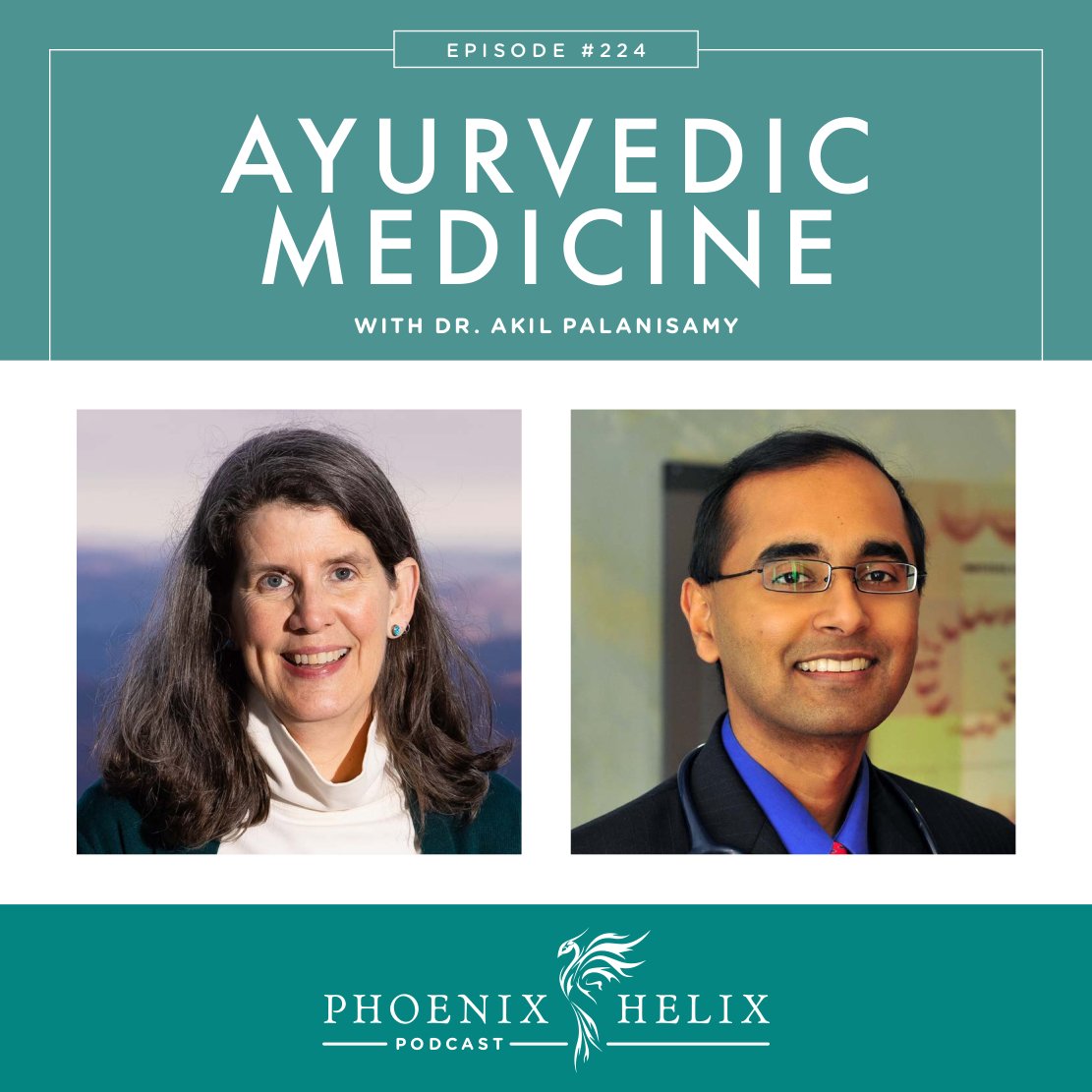Applying Ancient Medical Principles to Modern Life
Ayurvedic Medicine is an ancient medical tradition with roots in India, which contains wisdom that still applies to our health in modern day. Today, we’re going to learn how it may help people with autoimmune disease. My guest is Dr. Akil Palanisamy. Ayurveda changed his life both personally and professionally. As a young man he developed a mystery illness that modern medicine couldn’t solve. His fatigue was so intense, he couldn’t sit up in a chair and had to drop out of medical school. It was Ayurvedic medicine that put him on the path to healing. Now, he is a Harvard-trained physician who practices integrative medicine, blending conventional medical expertise with the holistic approaches of functional medicine and Ayurveda. His latest book is called, The TIGER Protocol: An Integrative, 5-Step Program to Treat and Heal Your Autoimmunity.
Listen to the Show
- Subscribe to my podcast through your favorite podcast app: iTunes, Google, TuneIn, Spotify, Amazon, etc.
- You can also listen to the episode right here through the player below, and if you subscribe to my newsletter you’ll get notified of future episodes.
Podcast: Play in new window | Download
Show Notes
- Intro (0:00)
- Thank You to Our Podcast Sponsor – Captain Soup (2:15)
- Captain Soup sells nutrient-dense freezer meals, designed specifically to enable the body’s healing. They only use the highest quality ingredients including locally sourced, 100% grass-fed and finished meats, wild-caught seafood, 100% organic vegetables, and bone broth made in-house from the bones and organ meat from the best grass-fed lamb in the world.
- They sell 7 flavors of soup which are paleo, keto, and Wahls protocol-compliant. 5 of those flavors also fit the elimination phase of the Paleo Autoimmune Protocol. 4 of the flavors are Low-FODMAP. And 2 flavors are GAPS-compliant.
- Here are the flavors: Classic Lamb, Dijon Lamb, Italian Beef, Classic Beef, Dijon Beef, Green Machine & Tom Kha. (Tom Kha is a seafood soup that’s available in-season.) They also have the full ingredient list for every flavor on their website.
- You can buy pre-selected variety packs or build your own custom box. They also have a nutrient-dense liver pâté that can be substituted for any soup upon request.
- Order today and get nutrient density delivered to your doorstep! Use the code PHOENIX to save $25 off your first order.
- Meet Dr. Akil Palanisamy (3:59)
- Dr. Akil is a Harvard-trained physician who practices integrative medicine, blending conventional medical expertise with the holistic approaches of functional medicine and Ayurveda. He is also the author of two books: The TIGER Protocol and The Paleovedic Diet.
- His personal experience with illness changed his career trajectory. He was in medical school when he developed a mysterious illness that Western medicine could neither diagnose nor treat. He experienced weight loss, chronic pain, and fatigue so intense that he couldn’t sit up in a chair and had to drop out of medical school. It was Ayurvedic medicine that turned his health around. When he learned about functional medicine, his health improved even more. He knew he wanted a medical practice that blended these three approaches.
- Ayurvedic Medicine vs. Western Medicine (5:35)
- Ayurveda is a qualitative system of medicine, focusing on the quality of health and disease and life overall. Western medicine is more quantitative, looking at labs tests and symptoms.
- Ayurveda is based on the 5 elements (earth, fire, water, space, and air). These are the primordial forces that comprise everything in the universe, including the human body. Western medicine looks at the body in isolation rather than as part of the universe.
- Ayurveda focuses on balance in the treatment of disease. That isn’t part of a Western medical model.
- Ayurveda also prioritizes the unity of body, mind, and spirit. In Western medicine, the mind and body are treated separately, and spirit is rarely addressed.
- Constitution – Prakriti (7:58)
- Constitution is the unique state of each individual that is determined at conception and stays with you throughout life. Ayurvedic medicine is very customized to the individual. There is no one-size-fits all approach. Instead, recommendations are personalized for your constitution, and this includes every aspect of therapy including diet, lifestyle, exercise, and stress reduction practices.
- There are 10 major types of constitution, and Dr. Akil has a quiz on his website to determine your body type: Ayurvedic Body Type Quiz.
- Life Force – Doshas (9:24)
- Doshas are the life forces responsible for all health and illness in the body. When harmonious and in balance, doshas support optimal health. When out of balance, we are vulnerable to disease and dysfunction. The goal isn’t to have equal amounts of each dosha. The goal is to return to our constitution – the balance of doshas we were born with. Most people have a primary and secondary dosha, and that determines the constitution (body type).
- One dosha isn’t better than another. Each has positive and negative manifestations. The goal is to express the positive aspects of your doshas. Doshas influence all aspects of health: physical, emotional, mental, spiritual.
- Our daily choices impact our doshas – either supporting balance and harmony, or throwing us out of balance. That is why our unique constitution guides diet and lifestyle recommendations. What supports balance for one dosha is very different from what supports balance for another.
- The Three Doshas:
- Vatta (wind) – Qualities of this dosha are light, cold, dry, and mobile.
- Pitta (fire) – Qualities of this dosha are hot, sharp, and penetrating.
- Kapha (earth) – Qualities of this dosha are cool, slow, heavy, steady, and reliable.
- Examples of Diet & Lifestyle Recommendations for Each Dosha (13:00)
- The goal is always to balance the dosha, so dietary recommendations are often the opposite of the dosha’s innate qualities. Exercise recommendations strive to channel the positive qualities of each dosha.
- Vatta (wind) – If this is your primary dosha, its qualities are naturally light and cold, so balancing foods are heavy and warm. The dietary recommendation would be to limit raw foods and prioritize cooked foods instead, especially soups and stews. For exercise, this body type can get depleted easily, so gentle forms of exercise are more beneficial than high intensity. The recommendation is to pursue low impact activities like yoga, tai chi, and walking.
- Pitta (fire) – If this is your primary dosha, its qualities are naturally hot, so cold foods offer balance. This body type does very well with salads and raw foods. For exercise, people with a Pitta body type are naturally competitive, and team sports are a great way to channel that competitive spirit in a positive way.
- Kapha (earth) – If this is your primary dosha, its qualities are slow and heavy, so vigorous exercise is recommended to overcome the natural inertia. High intensity exercise or CrossFit can be very helpful to this body type.
- Autoimmune Disease & the Doshas (17:05)
- There is no pattern where a particular autoimmune disease shows up more often in one dosha versus other. Instead, every autoimmune disease can appear in any dosha, but the symptoms will be different. Therefore, the Ayurvedic recommendations to restore balance and support immune health will also vary, being personalized to the constitution of the patient.
- Thank You to Our Podcast Sponsor – Fully Healthy aka ShopAIP (18:39)
- FullyHealthy.com is the new home of ShopAIP, an online store dedicated to the Paleo Autoimmune Protocol. With hundreds of items for the elimination phase of the AIP, and products labeled by reintroduction category as well. You can find protein bars, sauces and condiments, AIP-friendly spices, cooking and baking ingredients, waffle and pancake mix, delicious snacks, and more. It can be hard to find AIP products. Fully Healthy makes it easy!
- In addition to AIP foods, Fully Healthy is expanding their offerings to accommodate other specialty diets as well. That’s the reason behind the name change. Their goal is to make healthy shopping easy for you and your whole family!
- Everything on the website is clearly labeled with multiple ways to find the products you need. If you’re not sure where to begin, check out the Phoenix Helix Bundle, which contains some of my favorite AIP pantry items.
- Go to FullyHealthy.com and use the code PHOENIX for 10% off your first order!
- Pranayama (20:10)
- “Prana” means breath, and Pranayama are breathing practices that balance the life forces within our body.
- Pranayama is a mind/body/spirit practice. Physically, it boosts energy and relaxes muscles. Mentally, it improves clarity and reduces anxiety and stress.
- The only time pranayama is not recommended is during pregnancy or when high blood pressure is uncontrolled. It’s also best practiced on an empty stomach.
- Dr. Akil guided us through the pranayama practice of Anuloma Vilom (Alternate Nostril Breathing). Similar to the Traditional Chinese Medicine concept of Yin and Yang, Ayurveda has the concept of Ida and Pingula, and they are each linked to different nostrils. This pranayama practice balances those life forces and is beneficial for all constitutions and body types.
- Ayurvedic Dietary Principles (25:32)
- As we shared earlier in the podcast, dietary recommendations are personalized for each dosha and unique constitution, but there are some recommendations that apply to everyone.
- Ayurveda doesn’t recommend snacking between meals. It can slow down digestion. An exception would be someone with hypoglycemia who might need small snacks until their blood sugar is balanced. (Resource podcast: Ep. 190 – Blood Sugar and Autoimmune Disease).
- Fasting is also a big part of Ayurveda, so time-restricted eating is common. (Resource podcast: Ep. 103 – Fasting).
- Ayurveda recommends a whole foods, unprocessed, plant-forward diet. Animal protein might be recommended or not, depending on the dosha.
- There’s also the concept of the Six Tastes. Each one sends unique energy and information to the body, and it’s recommended all six be included in the daily diet:
- Sweet – this is a grounding taste. Examples of sweet foods are honey, sweet potato, and whole grains.
- Sour – this is a purifying taste. Examples of sour foods are citrus, tomato, eggplant, and vinegar.
- Salty – this is a balancing taste. Examples are sea salt, Himalayan salt, seaweed, and anchovies.
- Bitter – this is a detoxifying taste. Examples are coffee, leafy greens, and bitter melon.
- Astringent – this is a cooling, anti-inflammatory taste. Examples are green tea, black tea, asparagus, and legumes.
- Pungent – this is a warming, stimulating taste. Examples are garlic, ginger, cumin, and coriander.
- Beneficial Spices (30:23)
- Spices are are a big part of Ayurvedic medicine, and Dr. Akil includes detailed information about spices in both of his books.
- Turmeric is a well-known spice that’s highly recommended for its anti-inflammatory and anti-oxidant properties.
- But there are also spices that are less well-known that are worth seeking out:
- Black Cumin (also called Black Seed) can be found in many Asian grocery stores. It looks like a small peppercorn and can be included whole or powdered in any meat or vegetable dish. It has strong anti-inflammatory and anti-cancer properties.
- Ajwain is one of the most powerful spices for the gut and the gut microbiome. It reduces growth of harmful bacteria without damaging beneficial bacteria. Many Indian restaurants will have a bowl of ajwain and fennel seeds at the door. Chewing them after a meal supports digestion.
- Thank You to Our Podcast Sponsor – Luminance Skincare (33:43)
- Today I want to highlight their bestselling facecare trio, which includes their Delicate Cleanser, Rosewater Toner, and Deep Hydration Moisturizer. Each one of these products has over 500 five-star reviews on their website. And they have a sample kit, so you can try it yourself! The Delicate Cleanser gently and deeply cleanses your skin without drying it out. The Rosewater Toner perfectly adjusts and balances the pH of your skin. The Deep Hydration Moisturizer mimics skin’s natural oils to soothe dry skin while maintaining a clear complexion.
- Whereas conventional skincare products are full of chemicals that can hurt our bodies, Luminance is made from ingredients that nourish. Their products are natural, organic, wildcrafted, non-GMO, and gluten-free (and they’re even made in a dedicated gluten-free facility). It’s the cleanest skincare anywhere! And everything is handmade in small batches within the United States.
- They have a complete face and body care line, including cleansers, toners, moisturizers, masks, acne serum, lip balms, haircare, sunscreen, handcrafted soaps, and more.
- Order their sample kit today, and once you fall in love and want to order full-size bottles, use the code HELIX for 10% off your order. (You can also use the HELIX coupon on any Luminance product, not just the facecare trio.)
- The Ayurvedic Approach to Autoimmune Disease (35:19)
- Step 1: Panchakarma which focuses on detoxification. Treatments may include Ayurvedic oil massage, sauna or steam bath, castor oil packs, colonics or enemas, etc.
- Step 2: Dinacharya which establishes a daily routine of healthy habits. A common recommendation is to begin your day with oil pulling and tongue scraping. This supports a healthy oral microbiome, and there is a connection between oral health and autoimmune health.
- Step 3: Rasayana which focuses on rejuvenation. This will include rejuvenating foods customized for your body type, and also rejuvenating herbs and supplements, prescribed by a practitioner.
- The TIGER Protocol (40:00)
- This is Dr. Akil’s latest book and it focuses on autoimmune disease specifically. TIGER is an acronym for the five root causes of autoimmune disease
- T = Toxins. Like Ayurveda, detoxification is the first step of the TIGER protocol. Dr. Akil approaches detoxification gently. It’s easy to overwhelm the body if detoxification is pursued aggressively. First, he focuses on the preconditions to healthy detoxification (digestion, elimination, and hydration). He also teaches techniques to support healthy lymphatic drainage, educates about reducing exposure to toxins, and then gently uses food and spices to enhance detox capacity. Saunas are recommended as well.
- I = Infections. Dr. Akil’s approach is to make the body inhospitable to infections rather than trying to kill the germ (which is the approach in Western medicine). The pH of the large intestine greatly impacts the health of the microbiome. An optimal pH is between 5.0 to 6.5. Anything above 7.5 leads to the overgrowth of pathogenic bacteria and yeast (like E. coli and candida). Diet influences the intestinal pH, so Dr. Akil has recommendations in his book for spices and prebiotic foods that support an optimal pH level. Note: urinary pH isn’t correlated with intestinal pH. There are stool tests, however, that can measure intestinal pH.
- G = Gut. This step of the protocol focuses on healing the gut, reducing intestinal permeability, and building a healthy microbiome.
- E = Eating Right. The TIGER Protocol diet has two phases. Phase one is an elimination diet, removing common food sensitivities and inflammatory foods. This is followed by an 8-week reintroduction process. Phase two is a long-term diet that focuses on a diversity of foods which support a diverse microbiome.
- R = Rest. In addition to getting adequate sleep, it’s also important to find a mind-body practice you enjoy that helps relieves stress.
- Diabetogens and Obesogens (42:26 & 46:18)
- Toxins aren’t just a root cause for autoimmune disease, but they are a root cause of other health issues as well. Diabetogens and obesogens are toxins that promote insulin resistance and fatty liver, and also disrupt our ability to regulate weight effectively.
- Some examples are heavy metals, BPA, and other environmental pollutants. They’re present at low levels in our food/water/air, and have a cumulative impact.
- This is one of the reasons that detoxification is the first step in medical treatment within Ayurvedic medicine and also the first step of Dr. Akil’s TIGER Protocol.
- TIGER Protocol Diet vs. The Paleo Autoimmune Protocol (50:25)
- They’re both elimination diets with an elimination phase, a reintroduction phase, and a maintenance phase (a personalized long-term diet which incorporates more diversity than the elimination phase).
- The TIGER protocol elimination diet isn’t quite as restrictive as the AIP. Whereas the AIP eliminates all grains, the TIGER protocol allows gluten-free grains. And whereas the AIP eliminates all legumes, the TIGER protocol allows moong dal (split mung beans), which are the easiest legume to digest according to Ayurveda. Kitchari is an Ayurvedic therapeutic food which combines moong dal with rice and spices.
- Unique Benefits of Saunas (53:16)
- Detoxification is the first step in an Ayurvedic approach to treating autoimmune disease, and it’s also the first step of the TIGER protocol.
- Scientists have studied sweating from exercise vs. sweating from a sauna, and while both are beneficial, saunas are more effective at detoxification. In his book, Dr. Akil reviews 20 toxins associated with autoimmunity, and over half of them can be excreted through sweat in a sauna.
- All types of saunas are equally beneficial (dry, steam, infrared).
- Outro (54:12)
- You can connect with Dr. Akil Palanisamy through his website. His books are: The TIGER Protocol and The Paleovedic Diet.
- Eileen (your podcast host) is the author of multiple books, written to help people thrive with autoimmune disease. Learn more on the Books Page.
- If you like this podcast, follow or subscribe through your favorite podcast app. You can also subscribe to Eileen’s monthly newsletter.
- Check out the entire archive of podcast episodes.
You May Also Be Interested In
Spreading the Word
If you like the podcast, please leave a positive review in iTunes. It would mean the world to me, and also helps others find the podcast. Here are some quick instructions using your iPhone:
- If you are already subscribed to my podcast: (1) Click the purple podcast icon. (2) At the bottom of the screen, click Library. (3) At the top of the screen, click Shows. (4) Click the Phoenix Helix podcast image. (5) Scroll down the page, and you’ll see Ratings and Reviews. Scroll down a little bit more and click on Write a Review. This will bring up the review screen. Tap 5 stars (if you love the podcast), and then click in the title box, and it will bring up the keyboard. Enter a title and short review. (6) Click Send in the upper right corner. (7) Thank you! Positive reviews give the podcast a higher search ranking in iTunes, helping people find it and letting them know it’s a quality podcast and worth their time to listen.
- If you haven’t subscribed to my podcast: (1) Click the purple podcast icon. (2) In the lower right corner, click the magnifying class. (3) Type Phoenix Helix in the search box. (4) Click the podcast cover in the Show list. (5) If you’d like to subscribe, click the + sign at the top of the screen. (6) To write a review, scroll down the page, and you’ll see Ratings and Reviews. Scroll down a little bit more and click on Write a Review. This will bring up the review screen. Tap 5 stars (if you love the podcast), and then click in the title box, and it will bring up the keyboard. Enter a title and short review. (7) Click Send in the upper right corner. (8) Thank you! Positive reviews give the podcast a higher search ranking in iTunes, helping people find it and letting them know it’s a quality podcast and worth their time to listen.








